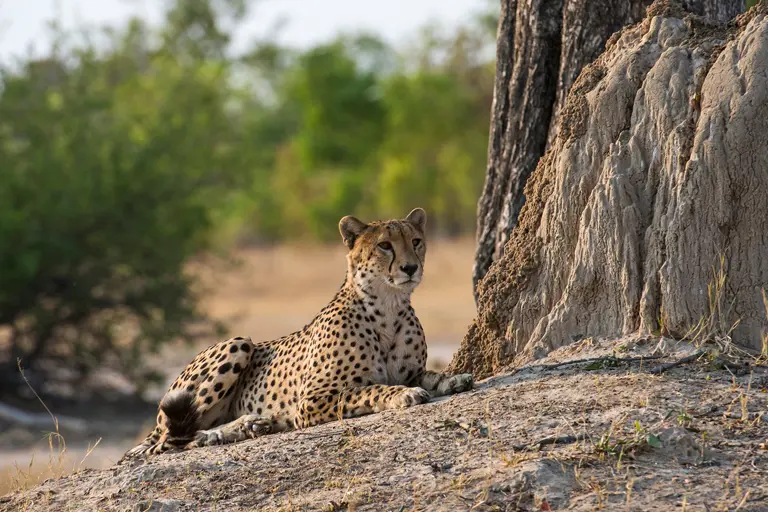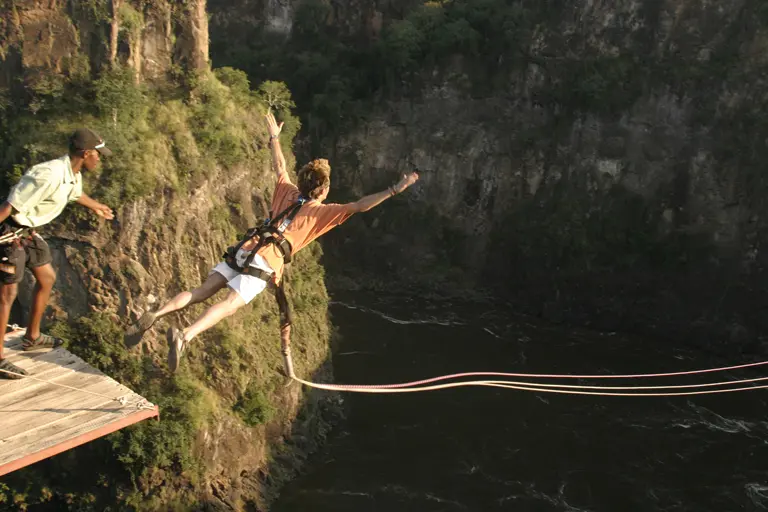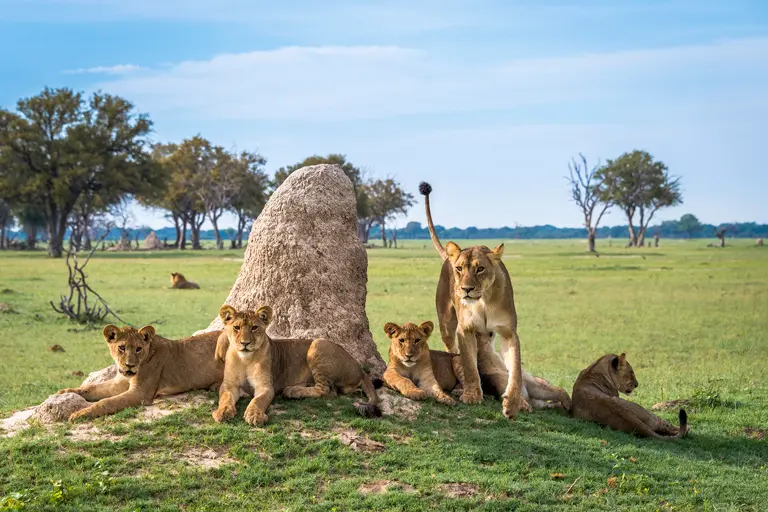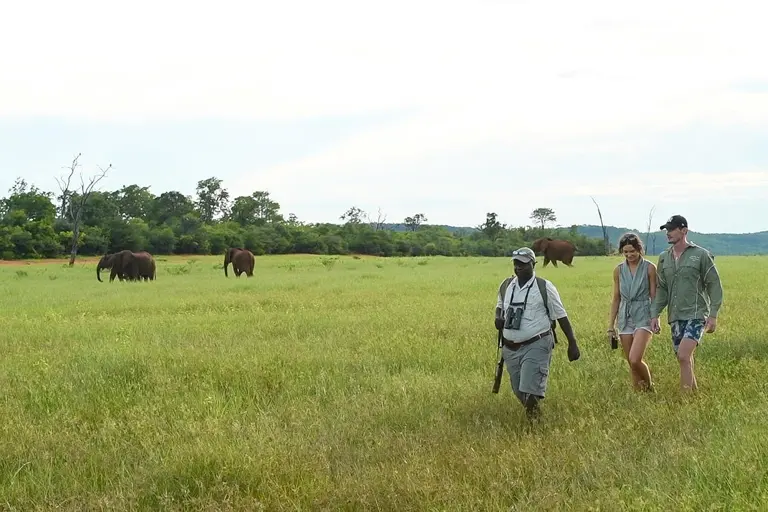





Reasons to Visit Zimbabwe
Victoria Falls
Wildlife
Ancient Historic Sites
Zimbabwe, located in southern Africa, is a landlocked country bordered by Botswana to the south-west, Mozambique to the east, Zambia to the north/north-west (separated by the Zambezi River), and South Africa to the south.
With a population of over 16.5-17 million people as of 2018, Zimbabwe spans an area of 390,580 square kilometres. The country is known for its diverse landscapes, including savannahs, forest-topped mountains, fertile lands (once referred to as the breadbasket of Africa), moorlands, granite hills, and lush areas with flowing rivers.
Zimbabwe's geography is characterized by various features. The central and western plateau consists of acacia savannah, bushveld, and miombo or dry open woodland. In the south/south-east, the dry lowlands are abundant with baobab trees, thorny scrub, and various succulent tropical flowers and palms.
The country experiences different weather patterns due to its size. Summers are marked by late afternoon showers and storms, with maximum temperatures around 35°C. The rainy season occurs between November and April. Winters are dry and sunny, with conditions similar to the Mediterranean, albeit with chilly nights and early mornings.
Zimbabwe is renowned for its diverse flora and fauna. The country is home to a wide range of wildlife, including the famous Big Five (elephant, lion, leopard, rhinoceros, and buffalo). Hwange National Park, known for its easy accessibility from Victoria Falls, boasts an estimated 40,000 animals, including large elephant herds and giraffes. Other wildlife reserves such as Matopos and Mana Pools also offer excellent game viewing opportunities. In addition to the Big Five, Zimbabwe is known for its sable antelopes, wild dogs (endangered species), cheetahs, and various bird species. The country has over 650 bird species, with migratory species making their appearance between November and April.
Zimbabwe possesses abundant natural resources, including coal, gold, nickel, copper, iron ore, tin, chromium ore, asbestos, lithium, and platinum group metals.
The major cities in Zimbabwe are the capital city Harare and Bulawayo.
The country has faced economic challenges in recent years, but efforts are being made to revive tourism and trade. Zimbabwe was once considered the breadbasket of Africa due to its fertile lands and agricultural productivity.
Zimbabwe's culture is diverse and influenced by various ethnic groups, including the Shona, Ndebele, Tonga, and others.
The country has a rich history, with ancient civilizations leaving their mark. The Great Zimbabwe Ruins, a UNESCO World Heritage Site, is a testament to the country's intriguing past.
The people of Zimbabwe are known for their warmth and hospitality, and their cultural traditions are celebrated through music, dance, art, and festivals.
Zimbabwe offers a wide range of attractions for visitors. The most famous among them is the magnificent Victoria Falls, one of the Seven Natural Wonders of the World. The falls attract tourists from around the globe and provide a breath-taking sight.
Besides Victoria Falls, Zimbabwe is home to other remarkable destinations such as Hwange National Park, known for its abundant wildlife, Matopos National Park with its unique rock formations, and Mana Pools National Park offering exciting walking and canoeing safaris. The ancient civilization of Great Zimbabwe, renowned for its rock art, is another notable historical site worth exploring.
To visit Zimbabwe, travellers need to ensure they have a valid passport with a minimum of six months' validity from the date of entry. Visa requirements vary depending on the traveller's nationality. Some countries are exempt from obtaining a visa, while others can obtain visas upon arrival or apply in advance. It's essential to check the specific visa requirements based on your nationality.
Zimbabwe operates on various currencies including the Zimbabwean dollar, the US dollar, Botswana pula, and South African rand. You may want to check with your travel agent as to what is most suitable for your trip. It's advisable to carry enough cash as ATMs may not accept all international cards.
Comprehensive travel insurance is highly recommended, covering medical expenses, emergency repatriation, and personal belongings.
When traveling to Zimbabwe, it is recommended to pack neutral-coloured casual clothing suitable for game viewing, including shorts, long trousers, shirts, and comfortable walking shoes. Additionally, it's advisable to bring a light jacket or jumper for summer and a warm jumper and jacket for winter. Other essential items include a sunhat, sunglasses, insect repellent, sunscreen, a refillable water bottle, a small first aid kit, and any necessary personal medications. Don't forget to carry your passport, travel insurance details, and sufficient funds to cover your stay.
In Zimbabwe the power plug sockets are of type D and G. The standard voltage is 220 V and the frequency is 50 Hz. If your electrical appliances use a different type of plug, you will need a plug adapter. It's important to check the voltage requirements of your appliances before using them in Zimbabwe. Some appliances may require a voltage converter or transformer for compatibility.
Comprehensive travel insurance is essential when visiting Zimbabwe. It should include full medical cover, emergency repatriation to your home country, and coverage for cancellation, loss, damage, theft of personal belongings, as well as personal injury, accidents, or illness. It is important to arrange appropriate insurance and understand the terms and conditions of the policy. Carry your insurance details with you at all times and provide the details before arrival. It may be required to show your insurance on the morning of safari departure or complete an indemnity form.
